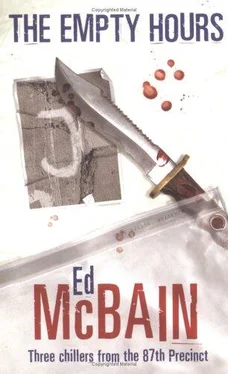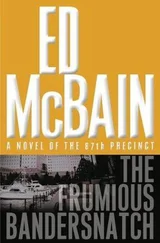That was the introduction.
They had gone into the bedroom where the man was lying at the foot of the dresser. The man was fifty-three years old. He lay in his undershorts on the floor in the sticky coagulation of his own blood. He was a small man with a pinched chest. His hair was black and thinning, and bald patches showed his flaking scalp. He had probably never been handsome, even when he was a youth. Some men do not improve with age, and time and alcohol had squeezed everything out of this man, and drained him dry until all he possessed was sagging flesh and, of course, life. The flesh was still there. The life had been taken from him. He lay at the foot of the dresser in his undershorts, ludicrously piled into a heap of inert flesh, so relaxed, so impossibly relaxed. Someone had worked him over with a hatchet. The hatchet was still in the room, blood-flecked, entangled with thin black hair. The killer had viciously attacked him around the head and the throat and the chest. He had stopped bleeding by the time they arrived, but the wounds were still there to see, open and raw.
Hawes vomited.
He went into the bathroom and vomited. That was his introduction to death.
He had seen a lot of death since, had come close to being dead himself. The closest, perhaps, was the time he’d been stabbed while investigating a burglary. The woman who’d been burglarized was still pretty hysterical when he got there. He asked his questions and tried to comfort her, and then started downstairs to get a patrolman. The woman, terrified, began screaming when he left. He could hear her screams as he went down the stairwell. The superintendent of the building caught him on the second floor landing. He was carrying a bread knife, and he thought that Hawes was the burglar returned, and he stabbed repeatedly at his head, ripping a wound over his left temple before Hawes finally subdued him. They let the super go; the poor guy had actually thought Hawes was the thief. And then they’d shaved Hawes’s red hair to get to the wound, which time of course healed as it does all wounds, leaving however a reminder of death, of the closeness of death. The red hair had grown white. He still carried the streak over his temple. Sometimes, particularly when it rained, death sent little signals of pain to accompany the new hair.
He had seen a lot of death, especially since he’d joined the 87th, and a lot of dying. He no longer vomited. The vomiting had happened to a very young Cotton Hawes, a very young and innocent cop who suddenly awoke to the knowledge that he was in a dirty business where the facts of life were the facts of violence, where he dealt daily with the sordid and grotesque. He no longer vomited. But he still got angry.
He had felt anger on the mountain when the young girl fell out of the chair and struck the snow, the ski pole bending as she dropped into that ludicrously ridiculous posture of the dead, that totally relaxed and utterly frightening posture. He had felt anger by juxtaposition, the reconstruction of a vibrant and life-bursting athlete against the very real image of the same girl, no longer a girl, only a worthless heap of flesh and bones, only a body now, a corpse. “Where’s the stiff?”
He felt anger when Theodore Watt and his witless assistants muddied the residue of sudden death, allowing the killer a precious edge, presenting him with the opportunity for escape — escape from the law and from the outrage of humanity. He felt anger now as he walked back to the building which housed the ski shop and the rooms overhead.
The anger seemed out of place on the silent mountain. The snow still fell, still and gentle. The wind had died, and now the flakes drifted aimlessly from overhead, large and wet and white, and there was a stillness and a peace to Rawson Mountain and the countryside beyond, a lazy white quiet which denied the presence of death.
He kicked the packed snow from his boots and went up the steps.
He was starting down the corridor toward his room when he noticed the door was slightly ajar. He hesitated. Perhaps Blanche had come back to the room, perhaps ...
But there was silence in the corridor, a silence as large as noise. He stooped and untied the laces on his boots. Gently, he slipped them from his feet. Walking as softly as he could — he was a big man and the floor boards in the old building creaked beneath his weight — he approached the room. He did not like the idea of being in his stockinged feet. He had had to kick men too often, and he knew the value of shoes. He hesitated just outside the door. There was no sound in the room. The door was open no more than three inches. He put his hand against the wood. Somewhere in the basement, the oil burner clicked and then whoooomed into action. He shoved open the door.
Elmer Wollender, his crutches under his arms, whirled to face him. His head had been bent in an attitude of... prayer, was it? No. Not prayer. He had been listening, that was it, listening to something, or for something.
“Oh, hello, Mr. Hawes,” he said. He was wearing a red ski parka over his white shirt. He leaned on his crutches and grinned a boyish, disarming grin.
“Hello, Mr. Wollender,” Hawes said. “Would you mind telling me, Mr. Wollender, just what the hell you’re doing in my room?”
Wollender seemed surprised. His eyebrows arched. He tilted his head to one side, almost in admiration, almost as if he too would have behaved in much the same way had he come back to his room and found a stranger in it. But the admiration was also tinged with surprise. This was obviously a mistake. Head cocked to one side, eyebrows arched, the boyish smile on his mouth, Wollender leaned on his crutches and prepared to explain. Hawes waited.
“You said the heat wasn’t working, didn’t you?” Wollender said. “I was just checking it.”
“The heat’s working fine in this room,” Hawes said. “It’s the room next door.”
“Oh.” Wollender nodded. “Oh, is that it?”
“That’s it, yes.”
“No wonder. I stuck my hand up there to check the vent, and it seemed fine to me.”
“Yes, it would be fine,” Hawes said, “since there was never anything wrong with it. I told you at the desk this morning that the heat wasn’t working in 104. This is 105. Are you new here, Mr. Wollender?”
“I guess I misunderstood you.”
“Yes, I guess so. Misunderstanding isn’t a wise practice, Mr. Wollender, especially with your local cops crawling all over the mountain.”
“What are you talking about?”
“I’m talking about the girl. When those imitation cops begin asking questions, I suggest ...”
“What girl?”
Hawes looked at Wollender for a long time. The question on Wollender’s face and in his eyes looked genuine enough, but could there possibly be someone on the mountain who still had not heard of the murder? Was it possible that Wollender, who ran the inn, the center of all activity and gossip, did not know Helga Nilson was dead?
“The girl,” Hawes said. “Helga Nilson.”
“What about her?”
Hawes knew enough about baseball to realize you didn’t throw your fast ball until you’d tried a few curves. “Do you know her?” he asked.
“Of course, I know her. I know all the ski instructors. She rooms right here, down the hall.”
“Who else rooms here?”
“Why?”
“I want to know.”
“Just her and Maria,” Wollender said. “Maria Fiers. She’s an instructor, too. And, oh yes, the new man. Larry Davidson.”
“Is he an instructor?” Hawes asked. “About this tall?”
“Yes.”
“Hooked nose? German accent.”
“No, no. You’re thinking of Helmut Kurtz. And that’s an Austrian accent.” Wollender paused. “Why? Why do you want to ... ?”
Читать дальше












